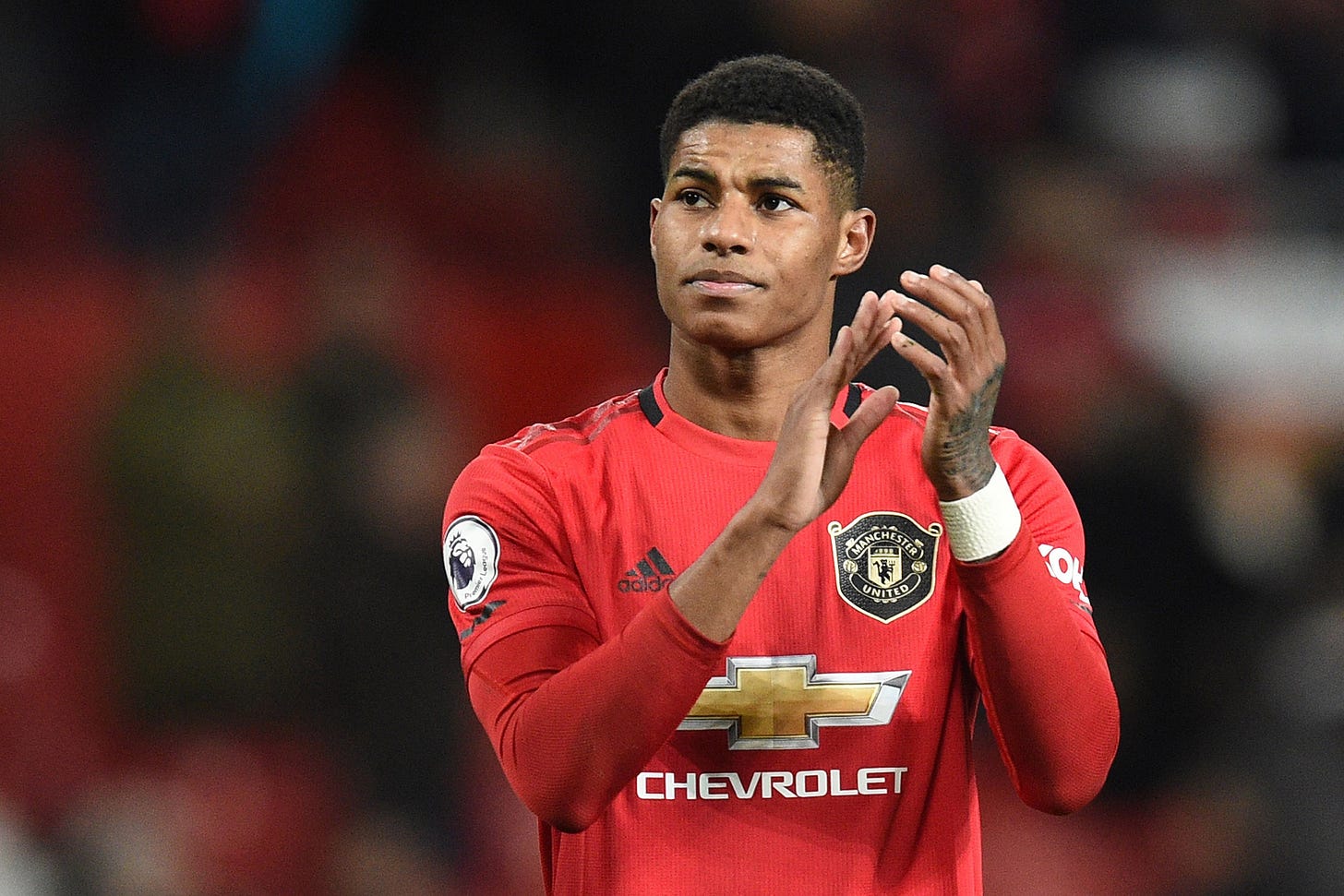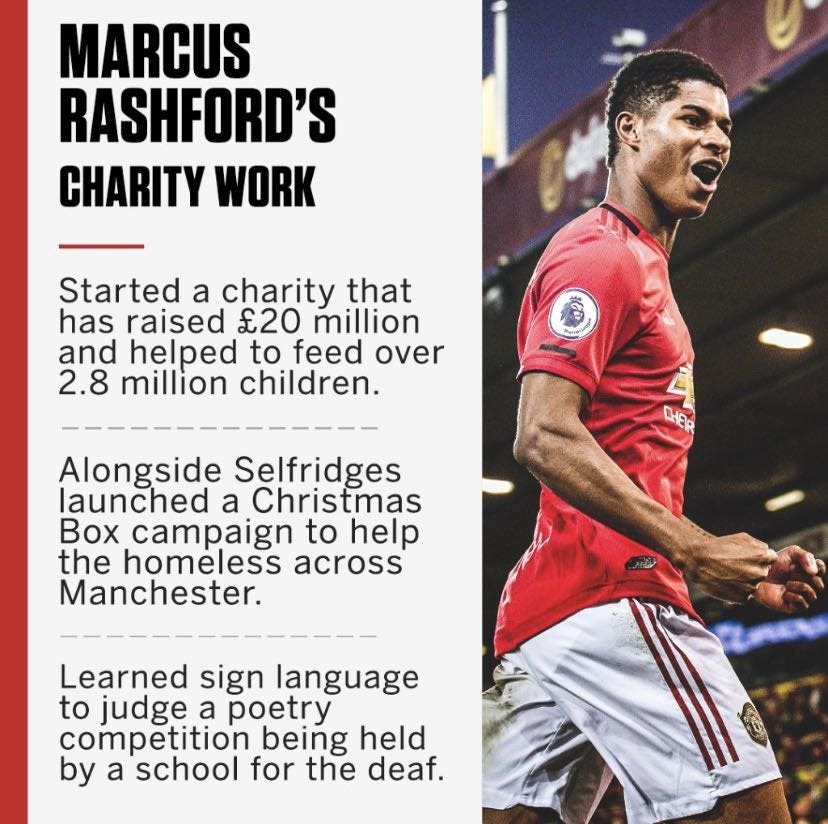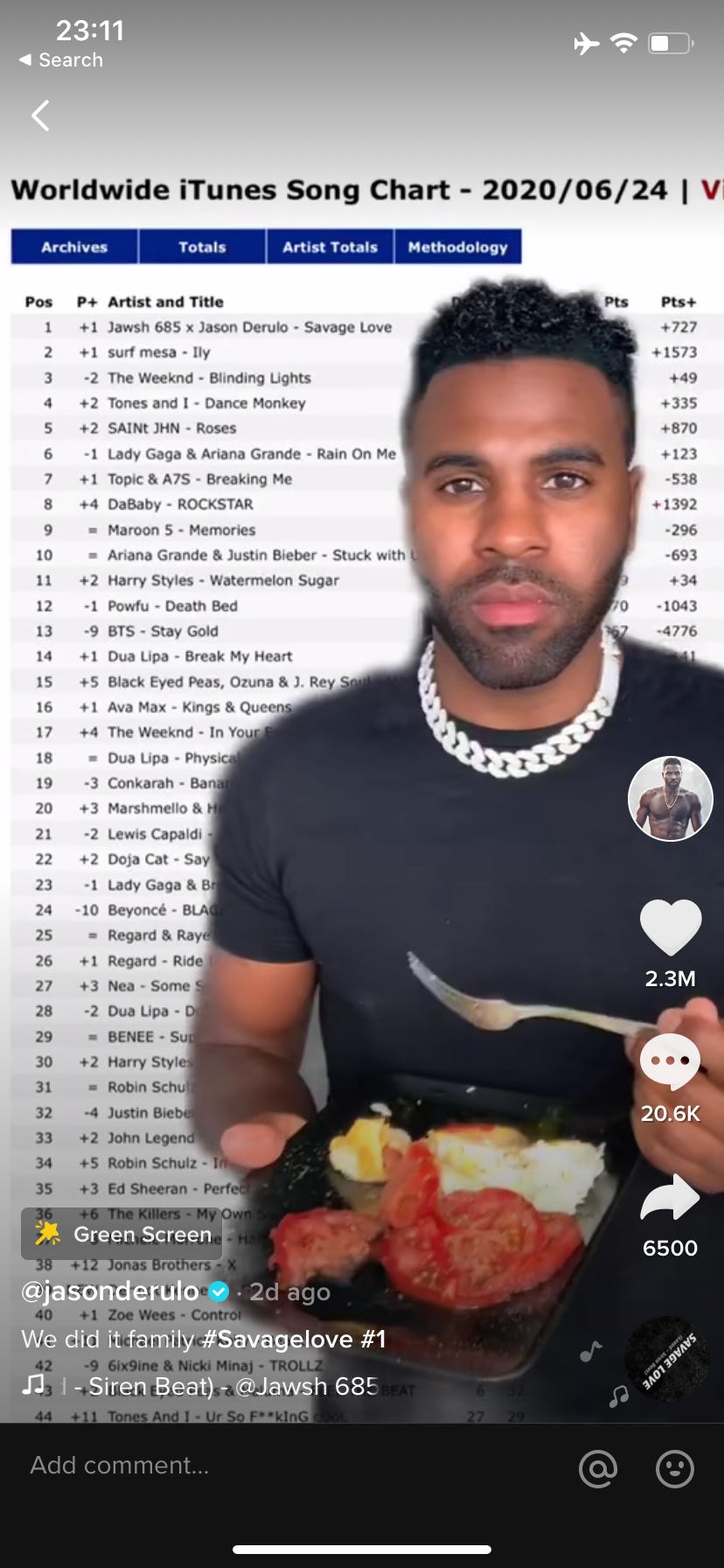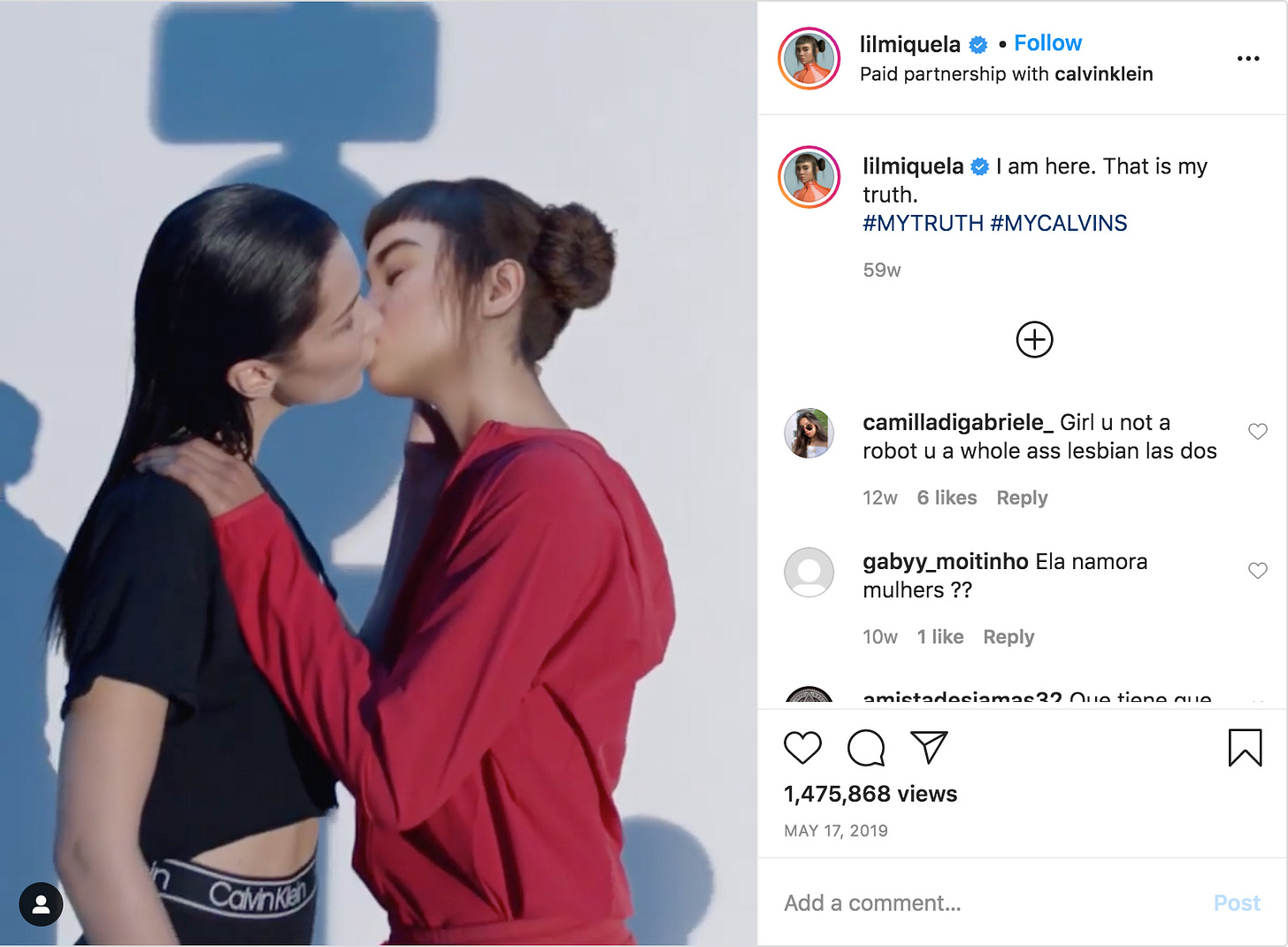3 Less Obvious Case Studies in Policy, Music, and Marketing
Make sure you subscribe to receive new updates!
Over the last few months, three case studies in the world of entertainment demonstrated how our evolving digital economy can shape policy, music, and marketing:
The first is Marcus Rashford, starting forward for Manchester United, who has influenced an actual policy change in the UK government.
The second is Jason Derulo, the pop star who unexpectedly turned out to be a TikTok genius, which has elevated his music career to new heights.
And the third is Lil Miquela, a virtual influencer created from CGI who keeps growing in popularity, revenue generation, and social influence.
If we look at these three case studies separately, they are pretty interesting. If we look at them together within the overall context of media and entertainment, they are all part of a broader trend where entertainers are expanding their realms of influence.
Marcus Rashford
On June 15, Marcus Rashford tweeted out an open letter to the British Government, urging them to extend the school food voucher scheme over the summer holidays.

1.3 million children in England from lower-income families are registered for a program that allows them to receive free meals from their local school. Marcus Rashford participated in the program himself when he was younger.
Given disruptions from the coronavirus, the program’s contribution to stopping food poverty and malnutrition has become even more essential. Before Rashford’s tweet, the program was supposed to end during the summer holidays since school is out of session. Recognising the unprecedented circumstances created by the coronavirus and citing thousands of parents who have reached out to him, Rashford sent out that tweet lobbying for the government to extend the scheme throughout the holidays.
The immediate response from UK Prime Minister Boris Johnson was to continue with the original plan to suspend the program. But amazingly, after a few days of increased media and political pressure, Boris Johnson announced that he will be extending the free school meal scheme throughout the summer and publicly commended Rashford.
Would this have even happened without Marcus Rashford? Probably not.

So a 22-year-old Manchester United football player can claim significant responsibility for actually helping feed a million struggling kids around the UK. This is on top of all the significant work he has done separately helping the charity FareShare raise £20 Million for three million meals. Marcus Rashford deserves a round of applause because his positive influence as an athlete extended beyond just sport.
A few months ago, I wrote an article about the potential for celebrity influence to extend into public policy, citing examples like Cristiano Ronaldo and Taylor Swift. Rashford still has a long football career ahead of him, but his work last month demonstrates that he is also thoughtful and passionate about making changes to improve society. Isn’t that a qualification we should demand from our politicians?

Steph Curry of the NBA’s Golden State Warriors donated funds to a similar free school meals program in Oakland. Lewis Hamilton is now actively leading the campaign against racism in Formula One. And while Colin Kaepernick is currently not playing in the NFL, his activism has led to a new role on the board of directors at Medium and a major deal with Disney/ESPN.
Having a voice and having a platform is something that technology in 2020 can amplify. Athlete activism has a long history and Marcus Rashford’s story is a great case study in behaviours we will see more often in athletes amidst today’s backdrop of political unrest, cultural movements, and social change.
Jason DeRulo
Earlier this year, a 17-year-old from New Zealand was sitting in his South Auckland bedroom making music. Joshua Stylah, whose stage name is Jawsh 685, was creating a siren track based on Polynesian music and then released it on TikTok. The song very quickly picked up steam and started being used by millions of people as background music for the Culture Dance Challenge.
Joshua didn’t realise this track would place him on a collision course with someone listening from a mansion halfway across the world in Los Angeles, the singer Jason Derulo. On top of Joshua’s beat, Jason Derulo added his own lyrics and melody and despite some disagreements and controversy, they released the song together. And ‘Savage Love’ went to number one on the worldwide iTunes download charts.

TikTok allowed Joshua Stylah to be ‘discovered.’ A lot has been written about TikTok being the music industry’s newest talent discovery tool and the majority of the Billboard Top 40 tracks now go viral on TikTok before the official charts.

Does this remind you of something? In 2018, a 19-year-old producer from Amsterdam called Young Kio was approached by a 20-year-old rapper Lil Nas X. Their collaboration became the song “Old Town Road,” which got its first major boost through TikTok and then eventually became the #1 song in the world.
Savage Love was only released a few weeks ago, but it could potentially become Jason DeRulo’s most successful single. Putting aside the success of Savage Love, DeRulo has been killing it on TikTok with his funny videos, dances, and overall entertaining content. He punches above his weight in terms of fame and followers.
It’s worth setting context here - Jason Derulo is not a household name. He’s a pretty famous popstar with songs like “Talk Dirty,” “Whatcha Say,” and “In My Head,” but he’s definitely not on the fame level of someone like Lady Gaga or Justin Bieber.
He’s at just the right level of fame where being super successful on TikTok required insight, hard work, and not just relying on his brand. On TikTok, Jason DeRulo has 28 Million followers and Justin Bieber has 16 Million followers.
Followers is not the only thing that matters, but it a relevant metric that has material impact on your commercial success. On Instagram, the much more established and globally representative platform, Jason Derulo has 6.2 Million followers and Justin Bieber has 140 Million followers.

That’s a pretty wild differential for the same two artists on two different platforms!
Derulo has discovered that his unique personality, brand, and talent can carve out a niche in TikTok that allows him to reach new levels of success. By ‘using’ TikTok well, Jason Derulo has essentially poured rocket fuel on his career and acquired a whole new group of young fans.
Jason was also able to ‘source’ his next single through keeping up to date with TikTok trends. When Jason Derulo released ‘Savage Love,’ the song was pre-vetted and de-risked. Before Savage Love was even released, Jawsh 685’s original song was being used in millions of tiktok videos with people doing a specific dance challenge to the beat. So turning Jawsh 685’s beat into a fully fledged song had a high chance of success given all the abundant ‘user testing’ that happened on TikTok.
Jason Derulo did something very smart that he didn’t have to do. He embraced TikTok and it gave him a competitive advantage. And very pragmatically, he used tiktok as a scouting tool to leverage new assets for his music career. Because of these actions, Jason Derulo has set himself up to reach entirely new levels of commercial success.
Lil Miquela
A few weeks ago, I sat down and watched a virtual concert called Miquela Covers. I found it so engaging that I watched the entire video. Lil Miquela is a pretty talented musician, entertaining host, and captivating public figure.
But Miquela Sousa is not a real person. ‘She’ is a virtual influencer created in 2016 by LA-based company Brud and currently has 2.4 Million Instagram followers.

I found Miquela’s concert surprisingly captivating for a few reasons:
1) Good Music - I really liked her song “Speak Up” and immediately went on Spotify to find it. Naturally, the song already has tons of covers and reactions videos on Youtube. I love how one of the song’s first lyrics is “How can we know if this thing is real?”
2) Mixed Reality - The entire concert was a mixture of virtual and real. The vast majority of the concert actually wasn’t Miquela singing, but a features group of up and coming artists Yuna, Justine Skye, and Bülow. Maybe just watching Miquela would have been too much, but the spotlight was primarily on young talent.
3) For A Cause - Not only was the concert entertaining, but Miquela was also raising money for a fund supporting musicians and music-industry workers impacted by the pandemic and also a grassroots organisation working against racism.

Virtual influencers aren’t new. They’ve been around since 2007 when a team from Japan first created Hatsune Miku, who went on to work with several companies including Google, Toyota, and Louis Vuitton. Virtual influencers are this hybrid artistic, marketing creation enabled by technology.
This mainstream appeal is more widespread in China and Japan, where virtual influencers Hatsune Miku and Luo Tanyi usually sell out concerts.

Especially in China, these virtual influencers do livestreaming, help sell products, and have deep partnerships with fashion labels to 'dress' them in branded virtual skins.
Last year, Lil Miquela was kissing real-life supermodel Bella Hadid in a Calvin Klein campaign.

But with coronavirus-imposed limitations and consumer trends, virtual influencers like Lil Miquela are growing given the world’s circumstances. Vogue Italy had CGI digital models on their cover for the very first time in the March 2020 issue. Just two months ago, Miquela officially signed with CAA, one of the world’s most influential talent agencies.
Last week, the World AI Conference in Shanghai began with a musical performance by four virtual singers. Dozens of virtual influencers like Miquela now exist, geared towards different regions and sub-cultures.

What makes Lil Miquela’s virtual concert especially interesting was the call-to-action asking people to donate. Miquela is now extending her influence as a marketing icon from fashion to music to social issues.
Her Instagram bio contains the description “Change-seeking robot,” and I predict that politics of 2020 will start seeing more ‘robots’ looking for change. In fact, many virtual influencers have already spoken out in response to the murder of George Floyd.
Is this right? Is this wrong? Is this weird? Whatever you believe, it’s an inevitable progression of youth digital culture. Nothing is holding us back from creating more Lil Miquelas.
Marcus Rashford, Jason DeRulo and Lil Miquela are three future faces of media and entertainment.
Athletes can affect policy more quickly than politicians, musicians can hack their career through novel social media tactics, and virtual influencers can create bigger brands than their real life counterparts.
Venn Diagrams…
Entertainment, Tech, Emerging Markets
If you enjoy this newsletter, don’t forget to share this with a friend and make sure you are subscribed. And please feel free to reach out to me over LinkedIn and Twitter!



